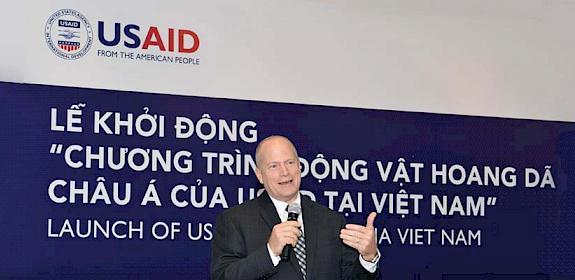Ton up: People not Poaching case studies reach milestone
Cambridge, UK, 4th August 2020—People not Poaching, an online learning platform that aims to support community-based approaches to tackling illegal wildlife trade (IWT) has recently added its 100th case study.
The platform brings together useful resources with contributions from conservation practitioners and communities, to compile a global evidence base to build awareness and knowledge-sharing about community approaches to reducing IWT.
The 100th case study added to the platform focuses on strengthening the capacity of wildlife authorities and enhancing human-elephant coexistence in the Ruaha-Rungwa ecosystem, Tanzania. Specific activities include supporting community-led wildlife monitoring networks, facilitating access to loans and credits for local communities, and improving data collection to aid anti-poaching operations.
Among the case studies online, 34% are from Africa, 33% from Asia and 29% from Latin America. They focus on over 140 plant and animal species, from the critically endangered Cross River Gorilla in Nigeria to high-value timber such as Siamese Rosewood in Cambodia.
Examples of the case studies include Vicuña management in the Andes through to Ban Ko Katha Bolchha Sarangi: Conservation through music in Nepal, which broadcast a series of songs telling the stories of those arrested for IWT and the impact it had on their families.
Almost two-thirds (63%) of the studies focus on what works and why, with a key recurrent them being that initiatives will only be successful if led from the bottom-up, with the active participation of local communities in project design and throughout project duration.
Some of the key lessons learned include:
- Local people should buy into a project idea, rather than have it imposed on them and it’s important to take time to understand local motivations for involvement in IWT.
- The involvement of traditional and religious leaders can be crucial to gaining community support and in encouraging communities to engage in environmental stewardship.
- Efforts should be made to involve all demographics from the community—in particular the involvement of women has been key to the success of initiatives.
- Building on and strengthening existing locally led institutions or initiatives should be encouraged over establishing new ones. These will be more familiar to communities, may be more sustainable long-term and are often more cost-effective.
- Where feasible seek out long-term donor support.
Conversely just over half the projects document what didn’t work and why with the majority citing the need to secure long-term and/or flexible donor funding as probably having had the greatest negative impact on outcomes.
Other key lessons learned include:
- Donors seeking immediate results limits what projects can realistically achieve and majorly affects continuity.
- Projects that have not spent enough face-to-face time with communities, or that have not had a constant onsite presence, have found it more difficult to maintain impetus and community support.
- Involving external parties from an early stage can make it more difficult to gain community trust and support.
- Plans should be adaptive and context specific—what works in one community probably won’t in another.
- Benefits received by communities are not always adequate to cover costs of living with wildlife.
People not Poaching is a joint project between the IUCN CEESP/SSC Sustainable Use and Livelihoods Specialist Group (SULi), The International Institute for Environment and Development (IIED) and TRAFFIC.




